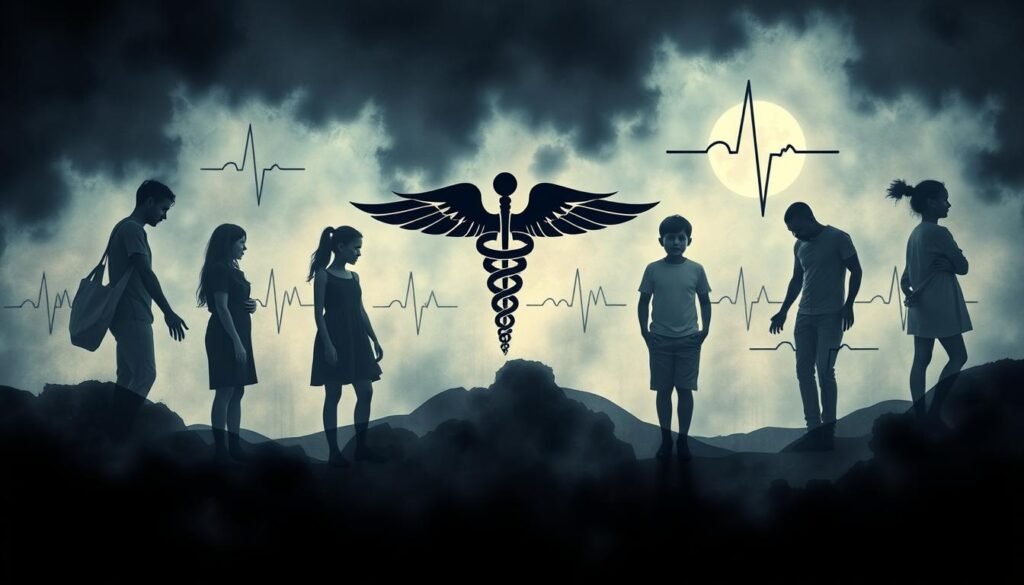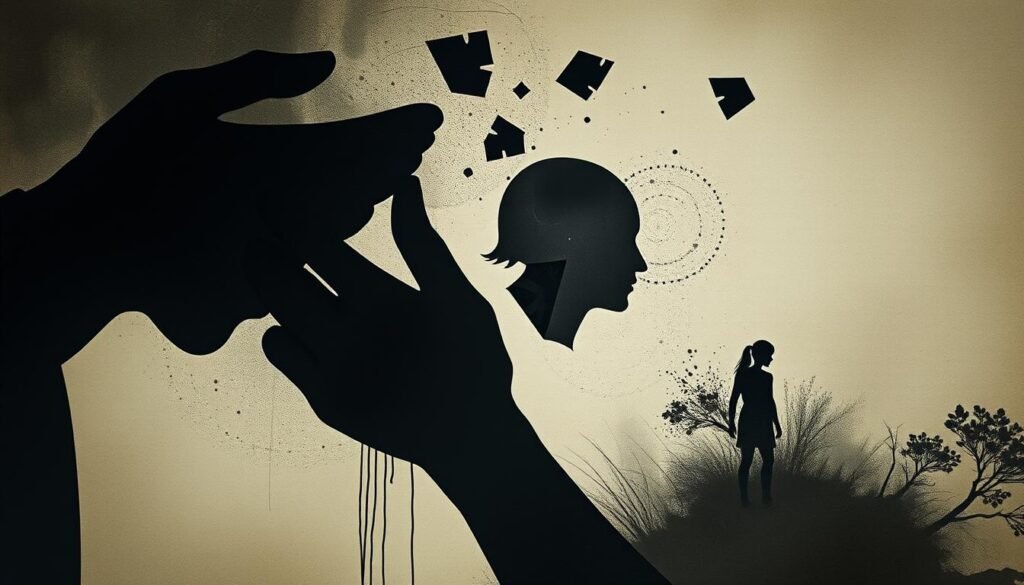About one in six people will face a major depressive episode sometime in their lives. This fact highlights how common depression is and how it impacts mental health. In our fast-paced society, knowing what can trigger depression is key. By understanding these triggers, we can find better ways to handle emotional challenges and improve our wellbeing.
Diverse factors can lead to depression, from genetic makeup to external pressures. For example, chronic illnesses, hormonal shifts, or problems in relationships can all be risks. Knowing these risk factors is crucial for maintaining emotional health.
Key Takeaways
- About one in six adults will experience a major depressive episode in their lifetime.
- Understanding depression triggers is crucial for effective management of mental health.
- Genetic predisposition may increase the risk of severe depression.
- Life events and social isolation can significantly impact emotional wellbeing.
- Hormonal changes during pregnancy and menopause are common triggers for depression.
- Unhealthy coping mechanisms like substance abuse can exacerbate depression symptoms.
Introduction to Depression
Depression is a mood disorder that affects millions worldwide. People with depression feel very sad and struggle with daily life. Besides feeling low, they might eat or sleep too much or too little.
There are different types of depression. Persistent depressive disorder has milder symptoms that last for years. Depression with psychosis includes severe symptoms like delusions. There are also disorders like disruptive mood dysregulation disorder and premenstrual dysphoric disorder.
About 29% of adults will be diagnosed with depression. Right now, 18% are dealing with it. Depression is more common in women than in men. It often starts in young adults, from late teens to mid-20s.
Treatment for depression is key. It can take weeks for antidepressants to start working. Patients might need to try different ones to find what works. Rapid relief options like Esketamine and brain stimulation therapy are available too.
It’s important to catch and treat depression early. Keeping an eye on those starting treatment is crucial. As many face this mental health challenge, reducing stigma is vital. It helps create a caring community.
What Are Depression Triggers?
Understanding depression triggers is key because many factors can cause this condition. Depression doesn’t come from just one place. It’s the result of biological, social, and psychological factors. Everyone’s experience with depression is unique, shaped by their own mental health challenges and life situations.
Stressful events like losing a job, going through a divorce, or retiring can be common triggers. These situations can make people feel lonely and hopeless, increasing the risk of depression. If these feelings last a long time, it’s important to get help. Knowing the causes of depression helps in handling these triggers better.
Genetics and personality traits also impact who gets depressed. For example, people who easily feel rejected might get depressed more easily when left out. Also, having strong friendships is important for emotional health. It helps deal with mental health stressors better.
It’s crucial to know when to seek help. Using benefit-finding techniques to see the good in bad situations can help. Understanding depression’s many sides can help people find the best way to improve their mental health.
Common Stress Factors Leading to Depression
Stress has a big impact on how we feel emotionally. Dealing with tough times, like losing someone close, money troubles, or relationship issues, can really weigh on us. These challenges can make us feel trapped and lead to depression if they don’t go away.
The numbers show that depression in Gen Z went up by 4% to 5% because of the pandemic. It’s crucial to tackle the stress that leads to mental health problems. If stress sticks around, it can make us feel sad and lonely and push us into bad habits.
Having people to support us makes a huge difference when we’re dealing with stress. Talking to friends, family, or experts can help a lot. When we share our struggles, it feels like the load gets a bit lighter.
Here’s a quick look at some tips for keeping stress at bay:
| Practice | Recommendation | Benefits |
|---|---|---|
| Physical Activity | 30 minutes of exercise, 5 days a week | Reduces stress and improves mood |
| Sleep | 7 to 9 hours per night | Eases stress and enhances mental clarity |
| Cognitive Behavioral Therapy (CBT) | Engage with a therapist | Helps change perspective on stress |
| Social Support | Maintain connections with loved ones | Provides emotional relief and understanding |
It’s key to understand how stress affects our feelings and day-to-day life. Knowing the signs of stress allows us to find better ways to cope. It also helps us build a network of people who can support us.
Life Events as Depression Triggers
Major life events can deeply affect our emotions, acting as depression triggers. Studies show that 80% of people with depression faced a big stressful event before. This shows that events like divorce, losing a job, or illness can lead to depression.
First-time depression often follows a tough life event. Research shows 70% of first depressions come after such challenges. Yet, only 40% of later depressions do. People who’ve had depression before are more likely to get it again, even from less severe events.
Stress from life changes may cause situational depression, which is similar to clinical depression. It can make you feel angry, change your eating habits, and disturb your sleep. This type of depression usually happens within months after the life change. Knowing this can help us find better ways to cope and lessen the stress from big life changes.
| Category | Impact Level | Common Examples |
|---|---|---|
| Severe Life Events | High | Divorce, Job Loss, Serious Illness |
| Non-Severe Life Events | Moderate | Relocation, Relationship Issues, Job Changes |
| Positive Life Events | Variable | Having a Baby, Marriage, Achievements |
Dealing with stress from life changes is key for our health. Eating well, staying active, and getting help when needed are good steps. Seeing life events as both good and bad helps us notice and care for our feelings.
Impact of Trauma on Mental Health
It’s key to grasp how trauma affects mental health to find good treatments. Trauma comes in many shapes and deeply touches our emotions. It often leaves lasting scars. Studies link it to many mental illnesses, especially when it happened in childhood, possibly leading to depression in adults.
How Childhood Trauma Influences Adult Depression
Childhood trauma messes with how we handle emotions, leading to harmful thoughts in grown-ups. About 1 in 10 adults in the U.S. feel depressed yearly. Traumatic experiences like abuse can make us more likely to get depressed later. For example, after the Oklahoma City bombing, depression rates soared among survivors—from 13% to 23%.
Those who faced trauma as kids might feel worthless or hopeless. It’s tough for them to ask for help. The connection between trauma and depression is clear when looking at PTSD. If someone has PTSD, they’re way more likely to be depressed. This shows how complex the link between these issues is.
Treatments like cognitive behavioral therapy (CBT) and SSRIs help with trauma-related depression. Finding joy in activities and relationships can also lift one’s spirits. It helps fight the sadness.
It’s crucial to understand and tackle all trauma types—acute, chronic, and complex. The True Life Center uses a mix of tailored treatments and holistic methods. These include art therapy, pet therapy, and meditation. They aim to help people recover from both trauma and depression. For more details on how trauma affects mental health, check out this study.
| Type of Trauma | Effects |
|---|---|
| Acute Trauma | Short-term, immediate psychological response to a single traumatic event. |
| Chronic Trauma | Long-lasting effects from repeated exposure to traumatic events, leading to persistent mental health issues. |
| Complex Trauma | Experiences of multiple traumatic events, often involving interpersonal relationships, leading to more severe and complicated mental health challenges. |
Grief and Its Connection to Depression
Grief is a deep emotional response when we lose someone dear. It’s a personal journey that varies from person to person. Sadness and yearning can mix with depression symptoms, mainly if grief lasts a long time. The Centers for Disease Control and Prevention (CDC) states up to 10% of adults may suffer from prolonged grief disorder. This can greatly disrupt daily life.
Understanding the link between grief and mental health is crucial. When we lose a loved one, intense grief may follow. This can make us feel hopeless or in despair. Grief and clinical depression share many symptoms. These include emotional pain and changes in eating and sleeping habits.

It’s important to know the difference between normal grief and clinical depression. Grief often brings waves of emotions, but major depression is a constant feeling of sadness. Someone grieving might still enjoy time with others. But, depression can make one pull away from people.
Dealing with grief in healthy ways is key. Exercise, support from friends or therapy, and joining support groups can help. Remembering important dates about the lost one is critical to healing too.
| Aspect | Grief | Depression |
|---|---|---|
| Duration | Fluctuating feelings over time | Persistent low mood |
| Social Interaction | May accept support from others | Tends to isolate |
| Focus on Loss | Longing for the loved one | Lack of interest in life |
| Symptoms | Emotional pain, sadness | Hopelessness, guilt |
It’s vital to seek help if grief stops you from doing daily tasks or if you feel guilty and aimless. Talking to a mental health professional can offer effective treatments. This might include therapy and medication. For those suffering, recovery is achievable with the right support and care.
For more insights on handling grief with depression, check out this resource. It shares important points on the journey through grief.
Hormonal Changes and Depression Triggers
Hormonal changes play a big role in mental health. This is especially true during key life stages such as pregnancy and menopause. Knowing how these changes tie to depression helps us support and treat people better.
Understanding Postnatal and Antenatal Depression
Antenatal depression happens when hormone levels change during pregnancy. These shifts make women more prone to mood swings. Symptoms include being very irritable and having mood changes.
After the baby is born, postnatal depression can occur. This is because of a sudden drop in hormones, affecting mood. Emotional challenges during these times show how hormones impact mental health.
The Role of Menopause in Mental Health
Menopause greatly affects mental health too. Drops in estrogen and progesterone lead to sadness and anxiety. This can make depression worse. Symptoms like hot flashes and mood swings also impact mental health.
Rising levels of follicle-stimulating hormone (FSH) during menopause also link to depression risk. It’s important to recognize these changes to help those going through menopausal depression.
| Hormonal Change | Triggered Condition | Symptoms | Potential Treatments |
|---|---|---|---|
| Antenatal Changes | Antenatal Depression | Irritability, mood swings, anxiety | Counseling, antidepressants |
| Postpartum Changes | Postnatal Depression | Extreme sadness, fatigue, emotional instability | Support groups, therapy |
| Menopausal Changes | Menopausal Depression | Sadness, anxiety, hot flashes | Hormone replacement therapy, counseling |
It’s key to understand how hormonal changes link to depression. This knowledge helps in preventing and treating it. This way, we can improve mental health outcomes for those affected.
Medical Conditions That May Trigger Depression
It’s key to understand how medical issues and depression are linked for better treatment. Many illnesses can trigger depression. Knowing these triggers helps both patients and doctors tackle mental health with physical health.
Chronic Illness and Its Psychological Effects
Chronic illness deeply affects mental health. Illnesses like heart disease, diabetes, and chronic pain can make depression more likely. Studies show up to 85% of those with chronic pain also suffer severe depression. Also, about 20%-30% of people with high blood pressure struggle with depression. This shows why treatment should focus on both chronic illness and depression triggers.
The Link Between Head Injuries and Depression
Head injuries can also lead to depression. A serious head injury can heighten the risk of depression. Research finds that brain injuries can cause mood disorders. This highlights the need for better care and support for people with brain injuries. Even after physical recovery, emotional symptoms can appear, pointing to a need for more research and support.

| Medical Condition | Percentage Affected by Depression | Comments |
|---|---|---|
| Chronic Pain | Up to 85% | Commonly overlaps with physical health complaints. |
| High Blood Pressure | 20%-30% | Linked with varied psychological symptoms. |
| Head Injuries | Varies widely | Often increases vulnerability to mood disorders. |
| Chronic Illness (General) | Higher risk | Conditions like arthritis and diabetes frequently result in depression. |
Knowing how medical conditions and depression are connected helps people seek the right care. This care may include therapy, medicine, and lifestyle changes to improve both physical and mental health.
Unhealthy Coping Mechanisms and Their Effects
People with mental health issues might turn to bad habits to deal with their feelings. These habits can make depression worse. They often result in feeling isolated and more symptoms. Common unhealthy ways include drug use and avoiding people. It’s key to know these behaviors to fight depression.
Substance Abuse as a Spiral into Depression
Some use alcohol or drugs to hide from their pain. These might seem to help at first but can make sadness deeper. Taking risks, like driving dangerously, often goes with drug use. This can make things worse. Over time, too much drug or alcohol use can cause big health problems, like addiction or overdose.
Studies show that those using bad coping ways often feel up and down, tired, and act without thinking. However, good habits like exercise or getting professional help can make you feel better. Understanding bad coping ways is the first step to getting better. You can find more about taking care of yourself at this resource.
Social Withdrawal and Its Consequences
Many with depression pull away from others. This can cause strong feelings of being alone and not worth anything. They often avoid people, thinking no one understands. This makes depression worse.
Getting past these bad coping ways takes work and time. Trying to reconnect with friends, joining group activities, and finding hobbies can help emotionally. It’s crucial to face these issues and look for better alternatives. This can help bring balance back to your mental health.
Understanding Depression Triggers in Relationships
Relationships deeply affect our mental health. They can be our biggest support or a major stress source. Many relationship issues are key depression triggers. Conflicts, miscommunications, or harmful patterns can make one feel alone and sad. Studies show that negative emotions in a relationship can make depression worse. This is especially true for those already prone to mood problems.
A study in 2016 revealed cheating can make depression more likely in at-risk individuals. A 2020 study found that violence in relationships can cause major depression, especially in women. These findings show how crucial healthy relationships are for mental health.

Long-distance relationships have their own challenges that can trigger depression. Anxiety about the relationship’s future is common. This can lead to more sadness and hopelessness, making things harder emotionally.
Depression can also lead to sexual issues and less interest in being intimate. This affects over a third of men and nearly half of women with depression. The strain this causes can make both the relationship and depression worse.
Spotting harmful patterns in relationships is key. Signs like feeling wrongly blamed, feeling insecure from a partner’s actions, or pulling away from friends are red flags. They show that something must change.
There are many ways to treat these mental health issues. Therapy, support groups, and changes in lifestyle can help break the cycle of bad relationship dynamics and depression. Working on these issues is crucial in dealing with depression triggers.
Conclusion
Understanding depression triggers is key to improving mental health. About 20% of people will face major depression or dysthymic disorder. Knowing the causes, like trauma or medical issues, helps people tackle their depression better.
Depression doesn’t just hurt the person; it costs society a lot. In the U.S., the cost is around $43 billion a year. Since 75% of those with major depression also have other disorders, finding and treating these issues early is crucial.
Despite the daunting stats, recovery from depression is very possible. It’s important to seek help through therapy, support groups, or medicine. This greatly helps in the recovery journey. Everyone is urged to use the resources available for a better future amid depression.